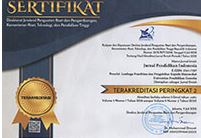INTEREST IN THE SOCIAL SERVICE WORK FIELD OF SPECIAL EDUCATION STUDENTS
DOI:
https://doi.org/10.23887/jpai.v3i2.21396Keywords:
Interest Work field Social service Special education StudentsAbstract
Students of Special Education (SE) are expected to have a high interest in the social service work field so that there is a compatibility with their education. However, the education selection of SE students is not always based on interest in the social service work field, so there is a possibility that SE students will not pursue a career in social service work field after they graduated. This study aims to determine the interest of SE students in the social service work field in the SE field. The respondents were 73 fifth semester SE students of Universitas Sebelas Maret (UNS), consisting of 54 female students and 19 male students. The sampling technique used is a non-random purposive sampling. RMIB interest test and a career interest questionnaire are used to collect the data. Data were analyzed by using frequency analysis. The results shows that (1) Based on the RMIB interest test, 79% of SE-UNS students have a high interest in the social service work field; (2) Based on the questionnaire, 60% of SE-UNS students choose to work in the social service field, such as teachers, social workers, heads of social foundations, sign language interpreters, principals, and social volunteers. Thus, it can be concluded that the majority of SE-UNS students have had interests in the social service work field in accordance with the SE field.
References
Berger, O. N. R. (2011). Field education in international social work: Where we are and where we should go, International Social Work, 55(2), 225-243.
Borg, W. R. (1981). Applying Educational Research: A Practical Guide for Teachers. New York: Longman Inc.
Brekke, J. S. (2012). Shaping a Science of Social Work, Research on Social Work Practice, 22(5), 455-464.
Crowley, A. L. W. & Kobl, F. L. (1993). Factors Related to Concentration Area Choice among Undergraduate Special Education Majors, 16(2), 171-177.
Dik, B. J. & Hansen, J. C. (2008). Following Passionate Interests to Well-Being, Journal of Career Assessment, 16(1), 86-100.
Harackiewicz, J. M., Smith, J. L., & Priniski, S. J. (2016). Interest Matters: The Importance of Promoting Interest in Education, Policy Insights from the Behavioral and Brain Sciences, 3(2), 220-227.
Harris, K. L. & Rottinghaus, P. J. (2015). Vocational Interest and Personal Style Patterns: Exploring Subjective Well-Being Using the Strong Interest Inventory, Journal of Career Assessment, 25(2), 203-218.
Kerlinger, F. N. (1990). Asas-Asas Penelitian Behavioral (Edisi Ketiga). Terjemahan. Yogyakarta: Gadjah Mada University Press.
King, L. A. (2017). The Science of Psychology: An Appreciative View. Third edition. Terjemahan. Jakarta: Penerbit Salemba.
Rude, H., A. & Lee, P. A. (1990). Identification of Promising Future Special Education Teachers through a Needs-Based Perspective, Teacher Education and Special Education, 13(3-4), 175-181.
Sthulmiller, C. M. (2005). Promoting Student Interest in Mental Health Nursing, Journal of the American Psychiatric Nurses Association, 11(6), 355-385.
Maree, J. G. & Molepo, J. M. (2004). Facilitating Post-Modern Career Counselling in the Limpopo Province of Facilitating Post-Modern Career Counselling in the Limpopo Province of South Africa: A Rocky Ride to Hope, Australian Journal of Career Development, 13(3), 47-54.
Lapan, R. T., Adams, A., Turner, S., & Hinkelman, J. M. (2000). Seventh Graders' Vocational Interest and Efficacy Expectation Patterns, Journal of Career Development, 26(3), 215-229.
Harris, K. L. & Rottinghaus, P. J. (2015). Vocational Interest and Personal Style Patterns: Exploring Subjective Well-Being Using the Strong Interest Inventory, Journal of Career Assessment, 25(2), 203-218.
Bergsten, U. (1980). Interest in Education among Adults with Short Previous Formal Schooling, Adult Education, 30(3), 131-151.
Watson, J. M. & Meiksins, P. F. (1991). What Do Engineers Want? Work Values, Job Rewards, and Job Satisfaction. Science, Technology, & Human Values, 16(2), 140-172.
Silvia, P. J. (2008). Interest—The Curious Emotion, Current Directions in Psychological Science, 17(1), 57-60.
Bye, D., Pushkar, D., & Conway, M. (2007). Motivation, Interest, and Positive Affect in Traditional and Nontraditional Undergraduate Students, Adult Education Quarterly, 57(2), 141-158.










